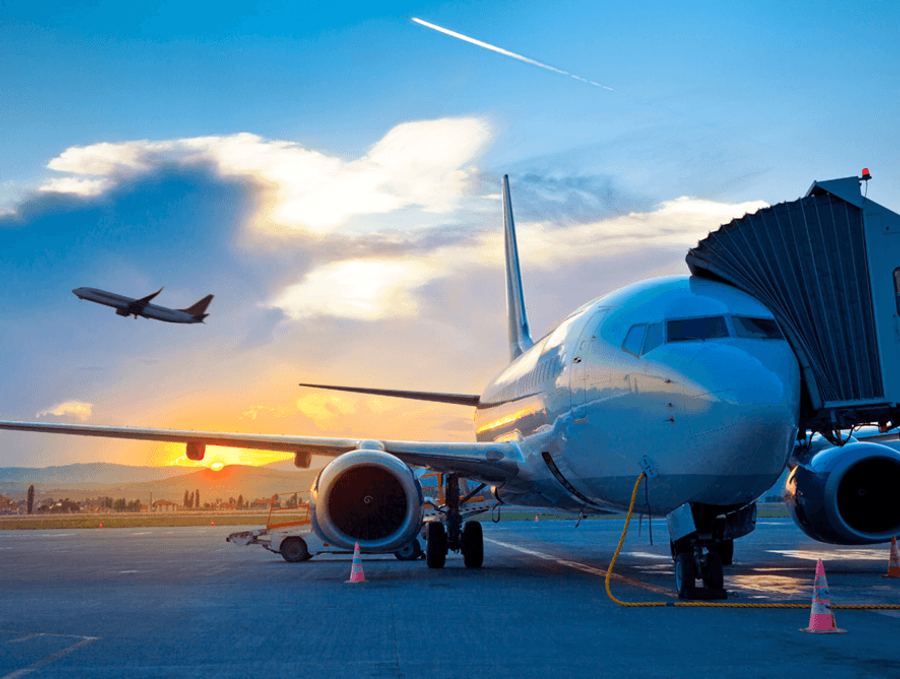Europe’s aviation industry hastens to implement e-SAF plants amid stringent carbon emission targets & the EU’s ‘Fit for 55’ initiative — and CEOs weigh in.
The race against time for Europe’s aviation leaders to advance their environmental agendas is notably led by substantial regulatory targets and a pressing need to curtail carbon outputs.
As the European Union (EU) pushes forward its ambitious ‘Fit for 55’ initiative under the broader Green Deal strategy, key stakeholders in aviation are now pivotal forces in the quest towards achieving net zero by 2050.
Pressures and incentives shape the eco aviation battlefield
Decarbonisation needs, economic and tech growth, alongside carbon pricing and incentives, are shaking the traditional aviation industry frameworks, marking a critical transitional phase.
Project SkyPower emerges as a formidable ensemble in this space, spearheaded by Amy Hebert, CEO of Arcadia eFuels and a Co-Chair of the initiative.
“Successful delivery of Project SkyPower’s action plan will fundamentally change the e-SAF landscape, establishing the necessary conditions to take Final Investment Decisions and accelerate this critical technology towards commercial operation by 2030,” she says.
“I am proud to co-chair Project SkyPower, leveraging Arcadia eFuels’ leadership on e-SAF development with commercial-scale production facilities across Europe. With the commitment and expertise of our members from across the value chain, we are poised to deliver tangible impact.”
Executives of the aviation sector, aligned with influential CEOs across Europe, are mobilising through Project SkyPower with urgency to tap into the enormous opportunities of e-SAF, potentially a predominant component of Sustainable Aviation Fuel (SAF) volumes by 2050.
Yet, despite these collective efforts, investments need acceleration or the industry risks failing to meet the impending regulated mandates, warns the latest industry insights from Project SkyPower.
Moreover, up to US$27bn of capital investment by 2030 could be necessary to achieve the desired scale, necessitating substantial annual investments thereafter.
“Decarbonising aviation is one of the tougher challenges and requires cooperative leadership to break down the silos. Partnering with governments, financial institutions and civil society is imperative to scale e-SAF to a tipping point where it not only progresses on urgent emissions reduction but also secures millions of jobs and future-proofs the aviation industry”. – Paul Polman, business leader and co-chair of Project SkyPower.
KEY FACTS ABOUT E-SAF
- Creates at least 90% less GHG emissions over its lifecycle compared to fossil jet fuel
- Produced using renewable electricity, water and carbon dioxide captured directly from the air and/or via point-source capture
- Faces fewer feedstock limitations in the long term compared to alternative aviation fuels and can therefore scale towards 2050 targets

Understanding Project SkyPower
Project SkyPower is not merely a coalition but a thriving collaboration of CEOs from AirFrance-KLM, Arcadia eFuels, Technip Energies, Copenhagen Airports, Velocys, easyJet, Natixis CIB, Rockton, SkyNRG, Topsoe, ING, KGAL and Victor.
The initiative aims to set a precedent for the e-SAF plants, with a target to reach a decisive investment phase by the end of 2025.
This project thrives on the expertise of over 50 companies, creating a synergy that drives towards first-of-a-kind technologies in this space.

However, the path is fraught with challenges. Without government support, production costs in Europe might be substantially higher than conventional jet fuels, considering Emissions Trading Scheme (ETS) expenses. Nonetheless, there’s a silver lining as costs are projected to halve through innovations and economies of scale if timely investments are made.
Steps towards a sustainable flight path
Project SkyPower is not just projecting insights but actively planning the way forward.
The leaders within Project SkyPower are preparing to meet before this year concludes to solidify strategies that translate analyses into proactive industry advances.

“Today, our industry faces its biggest challenge yet: reducing its climate impact,” says Marjan Rintel, CEO of KLM and co-chair of Project SkyPower on behalf of Air France-KLM. “e-SAF will play an important role in addressing this challenge.
“Project SkyPower is modelling the conditions required to overcome the barriers to scaling e-SAF. By working together, we now have a shared economic model for e-SAF, and an action plan to be implemented by the wider aviation ecosystem.
“It is this kind of collaboration that gives us the best chance of reducing our impact on the environment while continuing to deliver economic and social benefits.”



